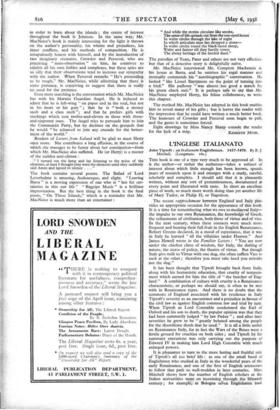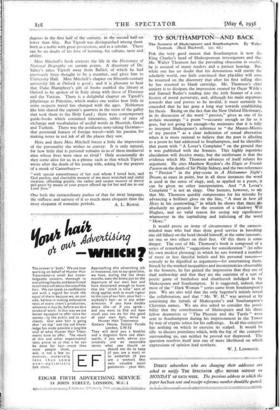L'INGLESE ITALIANATO
John Tiptoft an Ittlianate Englishman. 1427-1470. By R. J Mitchell. (Longmans. 16s.) This book is one of a type very much to be approved of. In it the author—or rather the authoress—takes a subject of interest about which little enough has been known, spends years of research upon it and emerges with a study, careful, scholarly and complete. I should add that it is pleasantly written, without any sort of pretentiousness, documented at every point and illustrated with taste. In short an excellent piece of work, so much more worth doing than yet another life of Mary Tudor, or Philip II, or Napoleon.
The recent rapprochement-between: Engind-Ind Italy vides an appropriate occasion for the appearance of this book. It is a time for remembering what we owe to-mediaeval Italy— the impulse to our own -Renaissance, ihe,knowledge of Greek, the refinements of civilisation, both those of virtue and of vice. In the next century, when these contacts were much more frequent and bearing their full fruit in the English Renaissance, Robert Greene declared, in a mood of repentance, that it was in Italy he learned " all the villainies under Heaven." And James Howell wrote in the Familiar Letters: "You are now under the chiefest clime of wisdom, fair Italy, the darling of nature, the nurse of policy, the theatre of virtue. But though Italy give milk to Virtue with one dug, she often suffers Vice to suck at the other ; therefore you must take heed you mistake not the dug."
It has been thought that Tiptoft brought back from Italy, along with his humanistic education, that cruelty of tempera- ment which earned for him the title of "the butcher of Eng- land." A combination of culture with cruelty is a Renaissance characteristic, or perhaps we should say, is often to be met with in Renaissance types. And there is no doubt that the commons of England associated with his residence in Italy Tiptoft's severity as an executioner and a-prejudice in favour of the civil law as against English common law and trial by jury. When Tiptoft as Lord Constable condemned the Earl of Oxford and his son to death, the popular opinion wat that they had been summarily judged "by law Padua " ; and after later seventies he grew to be "greatly behated among the people for the disordinate death that he used." It is all a little unfair on Renaissance Italy, for in fact the Wars of the Roses were a fertile ground for cruelties on both sides ; and Tiptoft by his summary executions was only carrying out the purpose of Edward IV in making him Lord High Constable with much enlarged -powers.
It is pleasanter to turn to the more lasting and fruitful side of Tiptoft's all too brief life : as one of the small band of Englishmen who studied in Italy in the wonderful years of the early Renaissance, and one of the first of English aristocrats to follow that path 'so well-trodden in later centuries. Miss Mitchell shows- how the number of English scholars at the Italian univertities went on increasing through the fifteenth century; for eitamAt at -Bologna seven Engfisimien took • degrees in the first half of the century, in -the second hitif-no
fewer than fifty. But Tiptoft was distinguished among them both as a noble with great possessions, and as a scholar. There can be no doubt of his love of learning, his culture, taste and ;. ability.
Miss Mitchell's book corrects the life in the Dictionary of National Biography on certain points. A discOvery. of Dr: Salter's takes Tiptoft away from Balliol, of which he had previously been thought to be a member, and gives him to
University Hall. Miss Mitchell's chapter on fifteenth-century university life at Oxford is good ; and it is pleasant to hear that Duke Humphrey's gift of books enabled the library at Oxford to be spoken of in Italy along with those of Florence and the Vatican. There is a delightful chapter on Tiptoft's Pilgrimage to Palestine, which makes one realise how little in same respects travel has changed with the ages. Noblemen like him shared the captain's quarters in the stern of the galley that took them to the Holy Land ; there were contemporary guide-books which contained itineraries, tables of rates of exchange and vocabularies of useful words in Moorish, Greek and Turkish. There was the assiduous note-taking German— that perennial feature of foreign travel—with his passion for making notes in red ink of all the places they saw.
Here and there Miss Mitchell forces a little the impression of the personality she wishes to convey. It is only natural, for how little that is personal remains to us of these mediaeval mien whose lives were once so vivid ! Only occasionally do they come alive for us in a phrase such as that which Tiptoft iirote after the death of his young wife, asking for the prayers Of a monk of Canterbury-
" with special remembrance of her soul whom I loved best, and God pardon, and charitable memoir of me most wretched and sinful creature, offending greatly, the rather and sooner recover of mercy arid grace by means of your prayer offered up for her and me to our Lord Jesu."
One feels the extraordinary pathos of that far away language, the stiffness and naivety of it so much more eloquent than the



































































 Previous page
Previous page